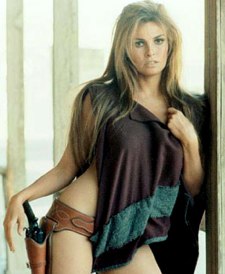New On DVD: Is Hannie Caulder the Original Rape-Revenge Pulp Flick?
 By now the rape-revenge pulp movie is a staple, but in 1971, when Burt Kennedy's Hannie Caulder leapt upon the anti-western bandwagon, they were brand-new. It was still five years before Lipstick (1976) and six until I Spit on Your Grave (1977) --incidentally two of the most reviled movies of that decade (and bombs to boot) -- and Charles Bronson's Death Wish (1974) was still a few years away, which in any case gave the gun to Bronson, not the woman in question. Did it all start with Burt Kennedy's modest, Spain-shot paella western?
By now the rape-revenge pulp movie is a staple, but in 1971, when Burt Kennedy's Hannie Caulder leapt upon the anti-western bandwagon, they were brand-new. It was still five years before Lipstick (1976) and six until I Spit on Your Grave (1977) --incidentally two of the most reviled movies of that decade (and bombs to boot) -- and Charles Bronson's Death Wish (1974) was still a few years away, which in any case gave the gun to Bronson, not the woman in question. Did it all start with Burt Kennedy's modest, Spain-shot paella western?
Maybe so, and that may be why no one had anything good to say about Hannie Caulder when it came out, the year of The French Connection and A Clockwork Orange and McCabe & Mrs. Miller; movies about a woman hunting down the men that gang-raped her were one step above pure exploitation then. Today, it's a classic paradigm, a feminist anthem redone a hundred times and still potentially as stirring as any political upheaval or fight-the-power manifesto. Everything is politics, and in a very real way you can't get more political than Raquel Welch in skin-tight buckskin pants.
Which may in fact pose a problem for the film politically: Welch's dazzling, ridiculous hotness is deliberately as tempting to our deepest reptile selves as she is to the movie's triumvirate of slavering, homicidal evil. Ernest Borgnine, Strother Martin and Jack Elam portray them as outlaw brothers loping angrily, sloppily around with booze-swollen faces, as if they got lost in a Sam Peckinpah movie and couldn't find their way out. Of course, Welch is even less convincing as a frontier wife assaulted by the trio in non-graphic but no uncertain terms. (Think about that for a minute -- were there in 1971 three less appetizing men?) Though it may not be P.C. to say so, one could logically guess that a woman who looks like that, with those cheekbones and that cleavage, wouldn't last long on the prairie as it was. Kennedy, a vet hack quite used to broad-boned westerns, sees no reason to not include a scene where Welch, left naked but for a blanket after her rape, must make a pair of man's trousers fit by taking a bath with them on.
The genre fun picks up once Welch crosses paths with supercool, bespectacled bounty hunter Robert Culp, and convinces him to teach her to shoot, so she may exact her revenge. Which she does. Is this a good movie? What a paltry debate to have under the circumstances, with Borgnine spouting profanities and hoisting himself around like a Fantasia ballet hippo and with Welch obviously shirtless under her poncho, pouring bullets into paunchy villains and only barely gritting her teeth as she does it. Welch never had the personality to be a star, but looking at her, you understand why producers couldn't help it.
And wait: I didn't mention Christopher Lee showing up relaxed and tanned as a gunmaker with a swarming brood of Mexican children (the film was actually produced by Tigon, a Brit company used to making Chris Lee-style horror films), or Stephen Boyd as a priest-slash-assassin who never utters a word. (Thank God for small favors.)
Hannie Caulder may not be the first feminist western, but it's certainly the first built around a woman's point of view -- at the same time giving that woman a loaded pistol, a swiveling hip to hang it on, and some fat bastards to obliterate in the same old Western-town sets we've seen male gunslingers stalk for decades. Sweet stuff.

Comments
You kids probably don't remember, but Christopher Lee was actually GOOD in some films!!! "Relaxed" is the key word. Astute, Mr. Atkinson. Very astute. Check out his "Saturday Night Live" if you don't believe me.
You kids probably don't remember, but Christopher Lee was actually GOOD in some films!!! "Relaxed" is the key word. Astute, Mr. Atkinson. Very astute. Check out his "Saturday Night Live" if you don't believe me.
The Last House On the Left was 1972. I'd think this counts as a rape revenge picture...
Hannie Caulder is a PG remakeof The Animals (aka Five Savage Men) with Michele Carey as the victim/revenger, Henry Silva as the noble Indian/trainer and Keenan Wynn as leader of the bad guys. It was released a year before Hannie Caulder and Burt Kennedy obviously saw it.
And Hannie Caulder was 1971...
Virgin Spring predated all this stuff (and of course inspired Last House), but that's not exactly pulp. And the girl doesn't exactly get her own payback.
A ha! Now we're talking. Thanks, Modin.
Obama announces, "All of us have right now been through close to ten years of battle. Wow You dont say?.verna.